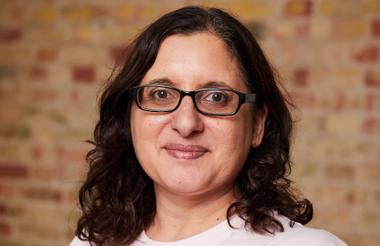Growing up in relative poverty in the UK, with parents working days and nights to give my siblings and I the best they could, and as a brown girl in a white person’s world, I can point to so many instances of being looked down on, being othered, and genuinely not knowing if it was my gender, our poverty, or my skin colour that was the reason people treated me differently – less than.
Last week the organisation I work for, Turn2us, released a race report on one of our grant funds. We make grants to individuals, and this fund is named after our Victorian philanthropic founder, Elizabeth Finn.
It’s important, and powerful, that Turn2us makes cash grants to people with no spending restrictions. While the practice of our social security system is not to require proof of expenditure of benefits you are entitled to, Turn2us is rare in the grants sector in that we don’t demand receipts from people as proof of how they spend their money. In the global humanitarian sector, that I left behind professionally in 2019, there is clear evidence that cash grants can really create the foundations of support for someone who has immediate and urgent financial needs.
Grants can give enough breathing space to someone to find the additional support, whether that be benefits or other services to help them recover from the atrocious denial of rights that has meant that they have needed the money in the first place. Making cash grants for people to choose to pay for their most immediate needs and without defining people by a type of poverty they may be experiencing (eg. bed, fuel, food poverty) is critically important. We know at Turn2us, from our own research, the positive impacts of grants. Some 86% of recipients felt that a grant has given them short term financial stability, and more than seven in 10 felt that a grant allowed them time to improve their situation. We know that making grants to meet people’s immediate needs gives people the opportunity to access other services they require without worrying about how to pay their next bill, or how to put food on the table.
There is no way to say this next bit without being blunt. The grantmaking sector that I joined in 2019, and the organisation that I joined are...white. I can assume many reasons for this, and one of them is that Victorian philanthropic mindset. The paternalism and the 'othering' of people in poverty is strongly redolent in a sector that still unapologetically uses the word 'benevolent'. All organisations carry society within them, and systemic forces of oppression are impossible to avoid completely. In this context, enough has been written on why having a predominantly white workforce is problematic and some grantmaking organisations are taking steps to address this, along with other signs of systemic problems that could cause harm.
Turn2us is one of them. In the two and a half years I have been with the organisation, to coin an overused phrase, we have been on a journey! Our workforce is becoming more diverse, we have a long way to go and some of us, as people of colour, don’t feel yet that the culture is our culture, but we are moving in the right direction. We have invested in training, in race equity reports, in target setting, in equity, diversity and inclusion, in challenging some of our practices. Most of us are up for the fight for change.
We have started doing impact reports on our work, and on our grants. It turns out that Victorian philanthropy has no place in addressing systemic injustices - who would have thought. And it also turns out that our heritage grantmaking causes harm to black and racially minoritised people.
The report tells us clearly that the racial bias in our systems has led to the way we make grants, our criteria for grants, and the intrusive way we assess people’s eligibility for grants to cause real harm to people already experiencing unfair barriers and prejudice.
Seeing this in black and white, on paper, in quotes, has affected us deeply. This is our 'heritage'. This grant fund has existed for almost 125 years. Well, it’s time to stop. Not time to stop making grants. Sadly, people’s rights continue to be denied in the fifth wealthiest economy in the world. Without enough money to live on, people can’t make good choices, can’t protect and care for those they love, can’t pay for the essentials that are their rights - food, water, shelter. So we have to use Turn2us’s wealth in a way that increases people’s chances to increase theirs. Without financial security, people cannot thrive and contribute to our society.
Cash grants are only a stepping stone. But we know that if we do this badly, our money doesn’t reach the people who need it most. Those of us whose rights have been denied because of the social injustices that have forced us into poverty won’t be reached. We don’t need to read the brilliant writing of Reni Eddo-Lodge, Afua Hirsch and Akala to know that those who are most often denied their rights, considered 'less than', have less opportunities to progress professionally, are overwhelmingly those with black and brown bodies.
So, it’s time to stop. To stop making grants without considering equity. To stop making grants in ways that exacerbate people’s experience of racial injustice. To stop unintentionally, yet systemically, judging people for who they are and the choices they make and the situation they are in.
We know there are other ways to make grants, we could be more participatory, we could shift decision making to those who have less opportunities to take control in their lives, we could target better, we could be less intrusive, we could trust people more.
We needed to see in black and white that our practices were harmful to be able to take that decision to change, to improve. We needed to listen, and we need to keep listening, we cannot redesign our grants with inherent bias, without understanding the actual life experiences of the people who need cash at the time when they are most vulnerable. We must do better, and in the journey of learning how to do better, we may still miss step or take some wrong turns. But we will no longer be beholden to a history that has been written over. To an outdated philanthropic model.
If Elizabeth Finn, the radical philanthropist of 125 years ago was alive today, she would know that radical philanthropy looks different now and that if we don’t use our wealth to fight for change, 'benevolence' will still exist in another 125 years and people’s rights still denied. We cannot choose to be part of the problem. Our only choice is to be part of the solution. So, we must, and will, change.
Sonya Ruparel is director of programmes and partnerships at Turn2us












